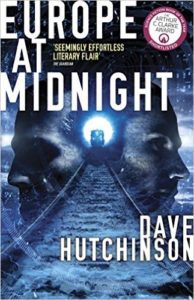Soon after reading The Collapse was just the right time to pick up Europe at Midnight, Dave Hutchinson’s second book set in a Europe that kept right on collapsing after 1989 and, by the unspecified date of the story, sends more than 500 entrants each year to the Eurovision Song Contest. Europe at Midnight splinters further than its predecessor, Europe in Autumn, alternating between first-person and third-person points of view. It’s not just Europe and the narrative that have broken down, however; the world itself has been rent asunder, or at least some parts of it have been hived off into something like pocket universes. It’s not magic, one of the characters assures another (and the readers); it’s a matter of topology. At least he didn’t say it was a simple matter of topology, because it isn’t.
Hints of this state of the world were dropped in Europe in Autumn. The second volume is not coy. The story starts on a peculiar Campus, one far more insular than even the most self-contained university in Europe. This one exists within tightly secured border controls that would have made East Germany shudder. It has recently had a revolution, but the even new regime’s head of Intelligence, who is the first-person narrator of much of the book, cannot find a way beyond the borders. Like any post-revolutionary regime, they are struggling — with questions of justice, what to do with the former oppressors; with reconstruction, as fighting damaged key points on the Campus; with exhaustion, as too few people are trying to do too many things all at once; with expectations, because the revolution was supposed to make lives better, not worse; with unreconciled centers of power, in this case a Science Faculty that is wealthy and secretive and seems to run on totalitarian lines; and with unexpected events, such as a deadly flu in a remote area that threatens to turn into a pandemic. Rupert of Hentzau is in over his head, as probably anyone would be, and his situation keeps getting worse. The former Medical Faculty had been engaging in gruesome genetic engineering. As shortages spread, so does hoarding, to say nothing of a drug connection with apparent ties to people very high up in Campus power circles.
Hutchinson leaves Rupert at the very edge of a crisis and switches to third-person narration, from the perspective of Jim, an officer in English Intelligence, who has to deal with an unusual stabbing on a bus. This bit reads like a good police procedural, very nitty-gritty, establishing a scene carefully, and then going through it one step at a time, showing different aspects from different people’s perspectives, all circling around a key event, at once known in detail and unknowable. In Jim’s debriefing things go a bit sideways.
There were the two women, sitting at their table; Shaw making notes, the older woman staring at him. And there he was, on his uncomfortable chair in the middle of the ugly carpet, outwardly calm and relaxed. …
Shaw looked at her colleague again, then made an after you gesture and started to write something on her pad.
“My name is Adele Bevan,” the older woman said. “I’m on secondment from Jesus College and I’m very interested in your stabbing victim because I think he may come from a parallel universe.”
There was an eternity of silence. Shaw continued dabbing at her pad, frowning slightly. She shook her head.
“I beg your pardon?” asked Jim.
Europe has split, the world has split, and from there on out, it’s a dance to figure out who knows what about whom, who is connected and where, and what the various powers-that-be may intend to do to each other.
“You’ll read the material later,” Bevan told him, “but the gist of it is that two hundred years ago a landowning family in Nottinghamshire somehow created an English county to the west of London. They called it ‘Ernshire.’ We don’t know how they did it, but we have circumstantial evidence that Ernshire was, and presumably still is, a real thing. The map which may have shown routes into and out of Ernshire has disappeared; no one knows how to visit it or even contact it.”
The Service knows a bit about Ernshire. In the late nineteenth century, there was some contact; someone from there apparently even invited Queen Victoria to visit. Then contact stopped. “It’s a country, Jim,” [Bevan said]. “A nation. It goes from Portugal to Moscow and they call it the Community. Millions of people, Jim, we don’t know how many. It’s not a risk we can ignore.”
Hutchinson tells these stories through the people caught in the middle. Rupert, Jim, Professor Bevan, numerous others deftly sketched and invested with humanity even if they play minor roles in the structure of the plot. They are not the ones making the grand plans; they are the ones who feel out of place at the party with the Cabinet members, but because they are out in the thick of things, they are nevertheless people on whom the grand plans depend. They are agents, in several senses of the word, yet they are buffeted by many events beyond their control.
An additional strength of the book, also shown in Europe in Autumn, is that the protagonists are not the sole moving parts in the world. Things take place off-stage that affect the narrators, and antagonists are working intelligently towards their ends while they are not in view, and the results only become apparent later. There are more stories in Europe and the adjoining worlds; Hutchinson has carefully selected which ones to tell to fill in more of the picture, with more to come. Europe in Winter will be published in November 2016.

